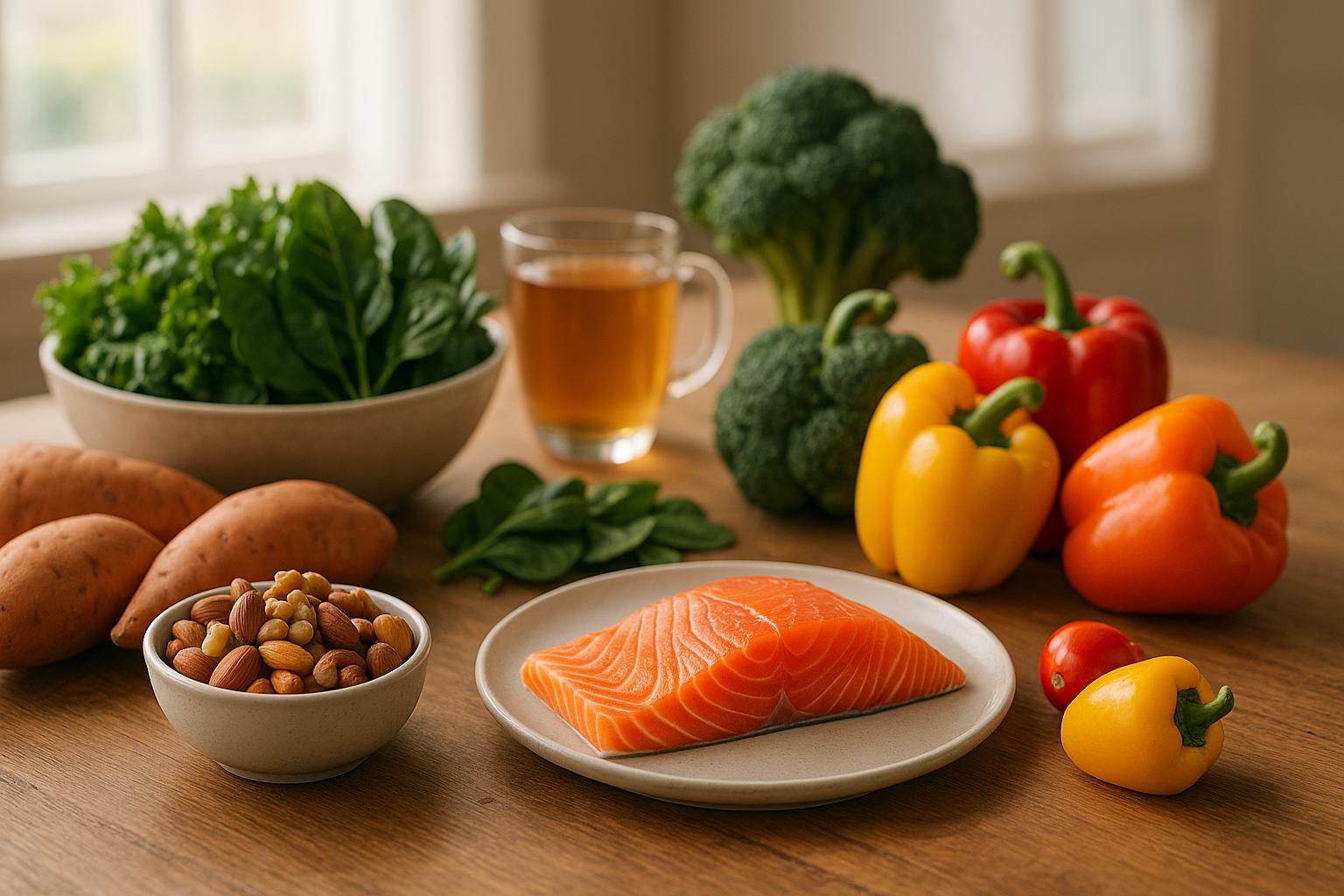Your adrenal glands play a key role in managing stress and energy levels. What you eat directly affects their function. A balanced diet of proteins, vegetables, healthy fats, and whole grains can support adrenal health, while refined sugars, processed foods, and artificial additives can disrupt it. Key tips:
- Eat nutrient-dense foods like wild-caught salmon, sweet potatoes, and avocados.
- Avoid refined sugars, processed snacks, and unhealthy fats to reduce stress on your adrenals.
- Meal timing matters: Eat every 3-4 hours and avoid skipping meals or late-night eating.
- Snack smart with options like nuts, fruits with yogurt, or veggie sticks with hummus.
7 Adrenal Superfoods That Fight Fatigue & Balance Cortisol
Foods That Support Adrenal Health
If you’re looking to keep your adrenal glands functioning smoothly, filling your plate with whole, nutrient-packed foods is a great place to start. These choices can help maintain balanced hormones and steady energy levels.
High-Quality Proteins
Protein is a cornerstone of a balanced diet, and it plays a crucial role in hormone production. Whether you prefer animal-based options like lean meats, eggs, and fish, or plant-based sources such as beans, lentils, and tofu, these proteins deliver the amino acids your body needs to function well. Variety is key, so mix and match to keep things interesting and nutritious.
Nutrient-Rich Vegetables and Fruits
Adding a rainbow of vegetables and fruits to your meals ensures you’re getting a wide range of vitamins, minerals, and antioxidants. These nutrients are important for supporting adrenal health and managing stress. While there’s no magic fruit or vegetable for adrenal support, the more colorful your plate, the broader the nutritional benefits you’ll enjoy.
Healthy Fats and Whole Grains
Healthy fats and whole grains are excellent for providing steady energy and aiding hormonal balance. Look for natural sources of unsaturated fats, like avocados, nuts, seeds, and olive oil. Pair these with fiber-rich whole grains such as quinoa, oats, or brown rice to keep your energy levels consistent throughout the day.
Water and Mineral Support
Staying hydrated is essential for overall health, and it’s especially important for managing stress. Drinking plenty of water and incorporating beverages made from natural ingredients can help keep your electrolytes balanced. This simple habit supports your body’s stress response and promotes overall well-being.
Foods to Avoid for Adrenal Health
While some foods can nurture your adrenal glands, others can disrupt their function and make things worse. Certain ingredients – like refined sugars, additives, and unhealthy fats – can trigger stress responses and throw off your hormone balance. Let’s take a closer look at how these foods impact your adrenal health.
Refined Sugars and Processed Foods
Refined sugars are a major problem when it comes to adrenal health. Foods like candy, cookies, sugary drinks, and pastries cause your blood sugar to spike rapidly. This forces your adrenal glands to release stress hormones, like cortisol, to manage the sudden surge. The trouble doesn’t stop there – when your blood sugar crashes shortly after, it sends your adrenals into overdrive again.
Processed foods add to the issue. Packaged snacks, instant meals, white bread, and breakfast cereals are often loaded with refined sugars, unhealthy fats, and sodium, while offering little nutritional value. These foods create constant blood sugar highs and lows, leaving you feeling “wired but tired” – stressed and alert, yet drained of real energy. Over time, this cycle can exhaust your adrenal glands and throw off your body’s natural energy patterns.
Artificial Additives and Preservatives
Artificial additives are another culprit. Artificial sweeteners like aspartame, sucralose, and saccharin may seem like a better choice than sugar, but they can disrupt your hormone balance.
Chemical preservatives – such as BHA, BHT, and sodium benzoate – place extra demands on your liver and other organs, which can indirectly stress your adrenal glands. When your body is already dealing with other stressors, these additives make things even harder.
Then there are artificial colors and flavors, which add no nutritional value but increase your body’s toxic load. While small amounts of these additives are considered safe, they often appear alongside other harmful ingredients, creating a compounded effect that can be especially taxing for those with sensitive adrenal systems.
Unhealthy Fats and Processed Meats
Trans fats and heavily processed oils are another issue. Found in fried foods, margarine, commercial baked goods, and packaged snacks, these fats can promote inflammation in your body, including in your adrenal glands. They don’t just lack nutrients – they actively interfere with your body’s ability to heal and function properly.
Deep-fried foods are particularly problematic. They’re often cooked in unhealthy oils, loaded with refined carbs, and packed with artificial additives. Processed meats, like sausages and deli cuts, add to the burden by increasing inflammation and making your body work harder to detoxify.
If you’re focused on supporting your adrenal health, cutting out these foods can make a big difference. They create inflammation, disrupt your hormones, and demand extra energy from your body to process and eliminate. Reducing or avoiding these items can help ease the strain on your adrenal system and improve your overall energy levels.
sbb-itb-d9e542d
Meal Planning for Adrenal Health
Eating in a way that keeps your blood sugar steady is key to supporting your adrenal glands and maintaining consistent energy levels. By focusing on balanced meals, regular timing, and smart snack choices, you can help your adrenals avoid unnecessary stress.
Balanced Meals and Snacks
To keep your energy steady and your adrenals in check, every meal should include three key components: protein, healthy fats, and complex carbohydrates. This trio works together to stabilize blood sugar and prevent energy crashes.
- Protein is the backbone of every meal. Aim for 20-30 grams per serving, about the size of your palm. Options like lean meats, eggs, lentils, or quinoa are great choices. Protein slows the absorption of carbs, helping to avoid blood sugar spikes that can overwork your adrenals.
- Healthy fats provide lasting energy and help you feel full. Include foods like avocado, olive oil, nuts, seeds, or coconut oil. These fats also reduce the temptation to snack on sugary foods between meals.
- Complex carbohydrates offer a steady release of energy without the highs and lows caused by refined sugars. Think sweet potatoes, brown rice, quinoa, or steel-cut oats – foods that release glucose gradually, giving your adrenals a much-needed break.
Here’s what a balanced day of meals might look like:
- Breakfast: Scrambled eggs cooked in coconut oil, served with sautéed spinach and a slice of sweet potato.
- Lunch: Grilled chicken on mixed greens with avocado, olive oil dressing, and a side of quinoa.
- Dinner: Baked salmon with roasted vegetables and brown rice.
Meal Timing for Energy Control
When you eat is just as important as what you eat. Consistent meal timing helps regulate your adrenal rhythm and energy levels.
- Start your day with breakfast within an hour of waking. A protein-rich meal stabilizes your cortisol levels, setting the stage for steady energy. Skipping breakfast forces your adrenals to release stress hormones, which can leave you feeling jittery or anxious.
- Eat every 3-4 hours. Long gaps between meals can cause your blood sugar to drop, triggering your adrenals to produce cortisol to compensate. Regular meals help avoid these dips.
- Avoid late-night eating. Try to finish your last meal or snack 2-3 hours before bedtime. Late-night eating, especially sugary or processed foods, can disrupt your natural cortisol rhythm, making it harder to fall asleep and stay asleep.
For better digestion and sleep, consider having your largest meal at lunch and keeping dinner lighter. This approach aligns with your body’s natural energy cycles.
Adrenal-Friendly Snack Ideas
Snacks that combine protein, healthy fats, and complex carbs can help maintain steady energy and prevent blood sugar crashes.
- Nuts and seeds: A handful of almonds with an apple or pumpkin seeds with berries make great options. Stick to raw or lightly roasted varieties to avoid additives that can strain your system.
- Fruit paired with protein or fat: Try apple slices with almond butter, berries with Greek yogurt, or a banana with a few walnuts. The natural sugars in fruit provide quick energy, while the protein or fat slows absorption for a steady boost.
- Vegetable-based snacks: Veggies like cucumber slices with hummus, celery sticks with sunflower seed butter, or cherry tomatoes with a small piece of cheese are nutrient-packed options that keep blood sugar stable.
- Homemade trail mix: Combine raw almonds, pumpkin seeds, a small amount of unsweetened dried fruit, and a few dark chocolate chips. Portion it out into 1/4-cup servings to avoid overeating.
- Air-popped popcorn: A simple whole-grain snack when made with a little coconut oil and sea salt. Skip the pre-packaged microwave versions, which often contain artificial ingredients and unhealthy fats.
Snack timing matters, too. If you notice your energy dipping mid-morning or mid-afternoon, that’s a good time for a balanced snack. Gradual hunger signals the need for fuel, while sudden cravings for sweets often indicate a blood sugar imbalance. A thoughtful snack can help correct this and keep you feeling steady.
Foods Comparison: Best vs Worst for Adrenal Health
Making smart food choices becomes much easier when you understand the clear differences between foods that support your adrenal health and those that might actually add to your stress. The impact of these choices can ripple through your energy levels, hormone balance, and overall stress response. Below, you’ll find a helpful breakdown comparing adrenal-friendly foods with those that could strain your system.
Comparison Table
Here’s a quick look at foods that can promote healthy adrenal function versus those that may work against it:
| Food Category | Best for Adrenals | Why It Helps | Worst for Adrenals | Why It Hurts |
|---|---|---|---|---|
| Proteins | Wild-caught salmon (3.5 oz), grass-fed beef, free-range eggs, organic chicken thighs | Provide high-quality amino acids with fewer inflammatory additives; support steady cortisol levels | Processed deli meats, hot dogs, bacon with nitrates, factory-farmed chicken | High in sodium and preservatives, which can trigger inflammation and disrupt hormone balance |
| Carbohydrates | Sweet potatoes (1 medium), quinoa (1/2 cup cooked), steel-cut oats, brown rice | Offer slow-releasing glucose to prevent rapid blood sugar spikes that stress the adrenals | White bread, pastries, candy, sugary cereals | Cause blood sugar spikes, leading to increased cortisol release |
| Fats | Avocado (1/2 medium), olive oil (1 tbsp), raw almonds (1 oz), coconut oil | Help with hormone production, reduce inflammation, and provide steady energy | Trans fats, vegetable shortening, margarine, fried foods | Promote inflammation and interfere with hormone synthesis |
| Beverages | Filtered water (8–10 glasses daily), herbal teas, coconut water, bone broth | Keep you hydrated, supply minerals, and assist with detoxification | Coffee (more than 2 cups), energy drinks, soda, alcohol | Overstimulate the adrenals, deplete nutrients, and disrupt sleep |
| Snacks | Apple with almond butter (1 tbsp), mixed nuts (1/4 cup), Greek yogurt with berries | Provide a balance of protein, fat, and carbs to stabilize blood sugar | Chips, cookies, candy bars, microwave popcorn | Cause blood sugar spikes and often contain additives or empty calories |
| Seasonings | Sea salt, fresh herbs, turmeric, ginger, garlic | Offer essential minerals, aid digestion, and reduce inflammation | Table salt, artificial sweeteners, MSG, high-sodium seasoning blends | Upset electrolyte balance and may trigger inflammation |
This table highlights how every food group plays a role in maintaining adrenal health. Choosing whole, nutrient-dense foods and preparing them with care can make a big difference. For instance, swapping a processed fish stick for a piece of wild-caught salmon not only avoids harmful additives but also provides omega-3 fatty acids, which may help reduce inflammation.
Portion size matters, too. Even foods that are good for your adrenals can cause stress if overconsumed. A small handful of raw almonds (around 1 oz) offers healthy fats and protein, but eating too many at once might overwhelm your digestive system. Similarly, while a single cup of coffee in the morning can help boost alertness, drinking multiple cups throughout the day could lead to unnecessary cortisol spikes.
The source of your food also plays a critical role. Grass-fed beef, for example, is richer in nutrients compared to grain-fed options, and organic vegetables are grown without synthetic pesticides that could burden your body’s detox processes. Making thoughtful, high-quality food choices sets the stage for better adrenal health and more balanced energy levels.
Conclusion and Next Steps
Taking care of your adrenal health starts with consistent eating habits that work in harmony with your body’s stress response system. Every food choice you make either supports your adrenal balance or adds unnecessary strain to this intricate hormonal network.
Focus on whole, nutrient-packed options like wild-caught salmon, sweet potatoes, and avocados. At the same time, steer clear of processed sugars, too much caffeine, and heavy late-night meals. Portion control and meal timing are just as important as the quality of your food. For example, a balanced breakfast with protein and healthy fats can help stabilize your energy for the rest of the day. But remember, food alone isn’t the full picture – addressing deeper imbalances is essential for long-term adrenal health.
Dietary changes, while powerful, may not resolve all aspects of adrenal dysfunction. That’s why it’s critical to uncover and address the root causes instead of just managing symptoms. Functional medicine in Brentwood shines in this area, offering a comprehensive approach to wellness by examining your lifestyle, genetics, and environment.
At Kinnection Clinic, we take a personalized approach to adrenal health. Using advanced diagnostics and targeted nutritional guidance, we create wellness plans that blend conventional medicine with natural therapies to tackle the underlying issues affecting your adrenal function.
Improving adrenal health goes beyond nutrition – it’s about a holistic approach. Incorporate stress reduction techniques like meditation or yoga, aim for 7–9 hours of quality sleep each night, and consider targeted supplements under professional guidance. Adaptogenic herbs such as ashwagandha and rhodiola, along with nutrients like vitamin C and B-complex vitamins, can offer additional support when used correctly.
Improving adrenal health is a journey that requires patience and commitment. But the rewards – more energy, greater stress resilience, and an overall sense of vitality – are well worth the effort. Consider scheduling a functional medicine consultation to develop a personalized plan tailored to your adrenal needs.
FAQs
How can I easily include adrenal-supporting foods in my daily diet?
To support your adrenal health, make sure your meals include plenty of lean proteins like chicken, fish, eggs, or nuts. Combine these with vibrant vegetables and leafy greens to pack in essential vitamins and minerals. Add a dose of healthy fats from sources like avocado, olive oil, or seeds, and stick to whole grains or minimally processed carbs to help keep your blood sugar steady.
Small, steady changes can go a long way. For instance, try swapping out refined snacks for a handful of nuts or adding steamed greens as a side dish. These simple adjustments can help your adrenal glands function better and keep your energy levels up.
What are the best ways to avoid harmful additives and unhealthy fats for better adrenal health?
To maintain adrenal health, steering clear of certain foods is key. Avoid items loaded with artificial additives, unhealthy fats, and excessive sugars. Processed foods, fast food, and packaged snacks are common offenders, often containing trans fats, refined sugars, and additives like MSG, sodium nitrates, or artificial sweeteners. Examples include fried foods, sugary desserts, and snacks made with white flour or hidden preservatives.
Instead, aim for a diet rich in whole, minimally processed foods. Opt for healthy fats such as olive oil, avocados, and nuts, and incorporate plenty of fresh, organic fruits and vegetables when you can. These choices not only limit exposure to harmful ingredients but also supply essential nutrients that support your adrenal glands and overall health.
What other lifestyle changes can support adrenal health and reduce stress?
In addition to eating a balanced diet, prioritizing quality sleep, managing stress with techniques like meditation or deep breathing, and sticking to a consistent daily routine can do wonders for adrenal health. Gentle exercises, such as yoga or walking, are excellent options for lowering stress and keeping cortisol levels in check.
Cutting back on stimulants like caffeine and alcohol, practicing mindfulness, and spending time outdoors can also help your body handle stress more effectively. Even small, steady changes to your lifestyle can have a meaningful impact on supporting adrenal health and improving your overall well-being.



